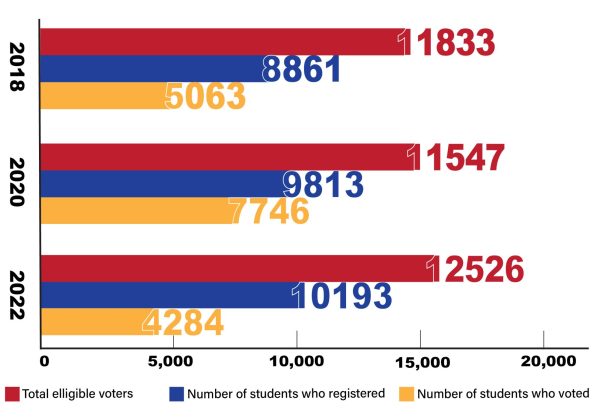Classroom wellness study aims to help students feel connected and supported
Marcie Young gets interviewed inside the Student Wellness Center on Thursday, July 29.
As mental health continues to move to the forefront of conversations, WSU’s Counseling and Prevention Services created a tool for faculty and staff to be involved in the discussion.
The classroom wellness study is a tool for faculty and staff to implement into their classrooms in order for students to feel more connected with their other classmates and the university as well as prioritize their mental health. The study includes a pre-test and a posttest as well as 32 exercises to do in between regarding mental health.
“I have been enormously impressed with the outpouring of support for this program that we have seen because of how much staff and faculty want to support student’s mental health right now,” Marci Young, Prevention and Outreach Director for CAPS, said.
Young said that the study is part of the #WeSupportYou program, and the way it was implemented changed due to COVID-19. They planned on introducing the study in classrooms on campus only, but when the pandemic hit, their priorities changed.
“We created this set of 32 exercises, and instructors can just read the cards and be able to do these things with their classes,” Young said. “Last year our instructors really wanted more resources, so we’ve actually given out over 600 sets of these exercises to faculty and staff and student groups.
“We really didn’t want to hold anything back that would potentially be helpful.”
CAPS has gotten positive feedback about the study— Connecting with other classmates over Zoom can be challenging, but these activities have helped students with getting to know their classmates on a more personal level.
“It helps them get to know people in their classes, it helps them with building skills, and we have heard a lot of feedback that it has overall been helpful,” Young said.
Each student has a choice to opt in or out of the study. For instructors who want to have their class participate in the study without implementing it into their classes, students will take the pre-test and post-test about connection, resilience, and overall emotional wellbeing without any kind of intervention from the cards during the semester.
“We helped instructors find ways to put it on Blackboard, to use it in chats, to do activities virtually outside of the classroom so it is something you can use in-person or digitally,” Young said.
In terms of time commitment, participating in the study will take 5-10 minutes a week for students, along with the pre-test and post-test at the beginning and end of the semester.
CAPS is hoping to see what parts work and what parts they need to improve in the study. Beyond that, what they really hope is to help students feel more connected and supported.
“I truly believe that instructors are here because they care about students, and not just about their subject, they care about the students,” Young said. “I think that a lot of them want to engage in helping our students in every way they can and everyone knows mental health is health.
“I would just want to reassure them that they don’t need to have knowledge about any of these things to implement this into their classroom.”

Julia Nightengale was a third-year reporter for The Sunflower, previously working as a Copy Editor and News Editor. Nightengale is a graduate student working...













